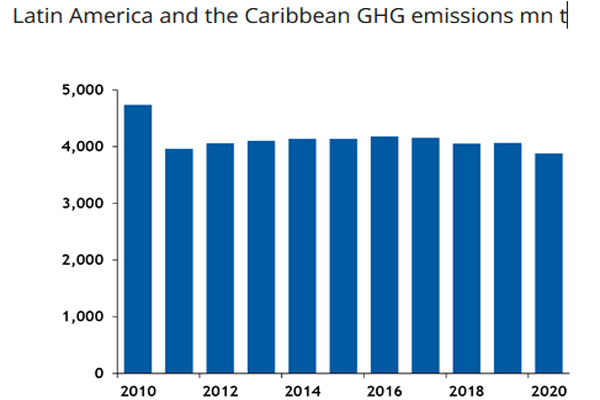
Jacqueline Echevarria, Argus Media
NEW YORK
EnergiesNet.com 03 26 2024
The Latin America energy sector is calling for the creation of a global taxonomy that sets standards for clean energy technologies and financial instruments to attract investment in clean energy technologies.
Around $1.8 trillion was invested in clean energy technologies globally in 2023, according to Paris-based the International Energy Agency (IEA). Over 80pc of that investment went to developed economies and China, while less than 15pc of investments in clean energy projects were made in developing economies.
Clean energy investment in emerging and developing economies needs to rise more than sixfold in the next 10 years to $1.6 trillion, according to the IEA.
“We are advancing in clean energy, but we are still far away from reaching 2030 targets,” said Clarissa Lins, founder and chief executive officer at consultancy Catavento.
Latin America has the resources needed to transition to cleaner energies in its entire supply chain. The share of renewables in its power mix is 60pc, double the global average. Countries like Brazil have an immense potential to decarbonize their transport sector using biofuels while the region has vast resources of critical minerals for the transition.
But the region needs to improve its risk-return profile if it wants to attract more private investment in clean energy technologies and this is a task that it cannot achieve alone.
The creation of a global taxonomy that sets standards and definitions of technologies and financial tools is a first step.
“We need to define what bonds mean, what low-carbon hydrogen and sustainable fuels mean so we can attract investment,” secretary of hydrocarbonsat the ministry of mines and energy of Brazil, Pietro Mendes, said.
Latin America could benefit from this global taxonomy as it could also add economic value to many products manufactured in the region that already have low-carbon intensity given the region’s less-polluting energy matrix.
“Everything produced in LatAm has already twice less carbon than in the rest of the world,” said Viviana Coelho, executive manager of climate change at Petrobras. “Everything produced in Brazil has four times less carbon than the rest of the world, but that is not valued globally. A global taxonomy would add value to those products that we managed to produce with less emissions.”
At a regional level, governments need to guarantee legal stability and create the right economic incentives and fiscal benefits for renewables. Policymakers need to work in collaboration with the private sector and local communities to guarantee developers can materialize their projects on time.
In this line, tender processes need to be more transparent, offering a clear pathway for investors that ensures they will be able to sign contracts for their projects.
“We need more feasible tenders to avoid an absence of offers,” said Andrea Arrobo, energy minister of Ecuador. The country last year launched a tender for 500MW of combined wind, solar and biomass capacity. No bids were received for biomass projects, according to the government. And some new wind and solar projects that were awarded in previous auctions have suffered delays because of the lengthy process to sign concession contracts.
Think forward
Latin America should not limit its ambitions in the energy transition to generating cleaner energy and should think ahead to take advantage of its resources to produce low-carbon by-products.
“LatAm doesn’t need to think only on green hydrogen exports, but also exports of green fertilizers and green petrochemical products,” Mendes said. “We need to develop the whole supply chain to produce other products and to industrialize our countries.”
Integration between governments and industries is also required to succeed with this goal as corporations that are willing to decarbonize can assume the costs of producing green products, but that also equires a competitive legal framework.
argusmedia.com 03 25 2024







